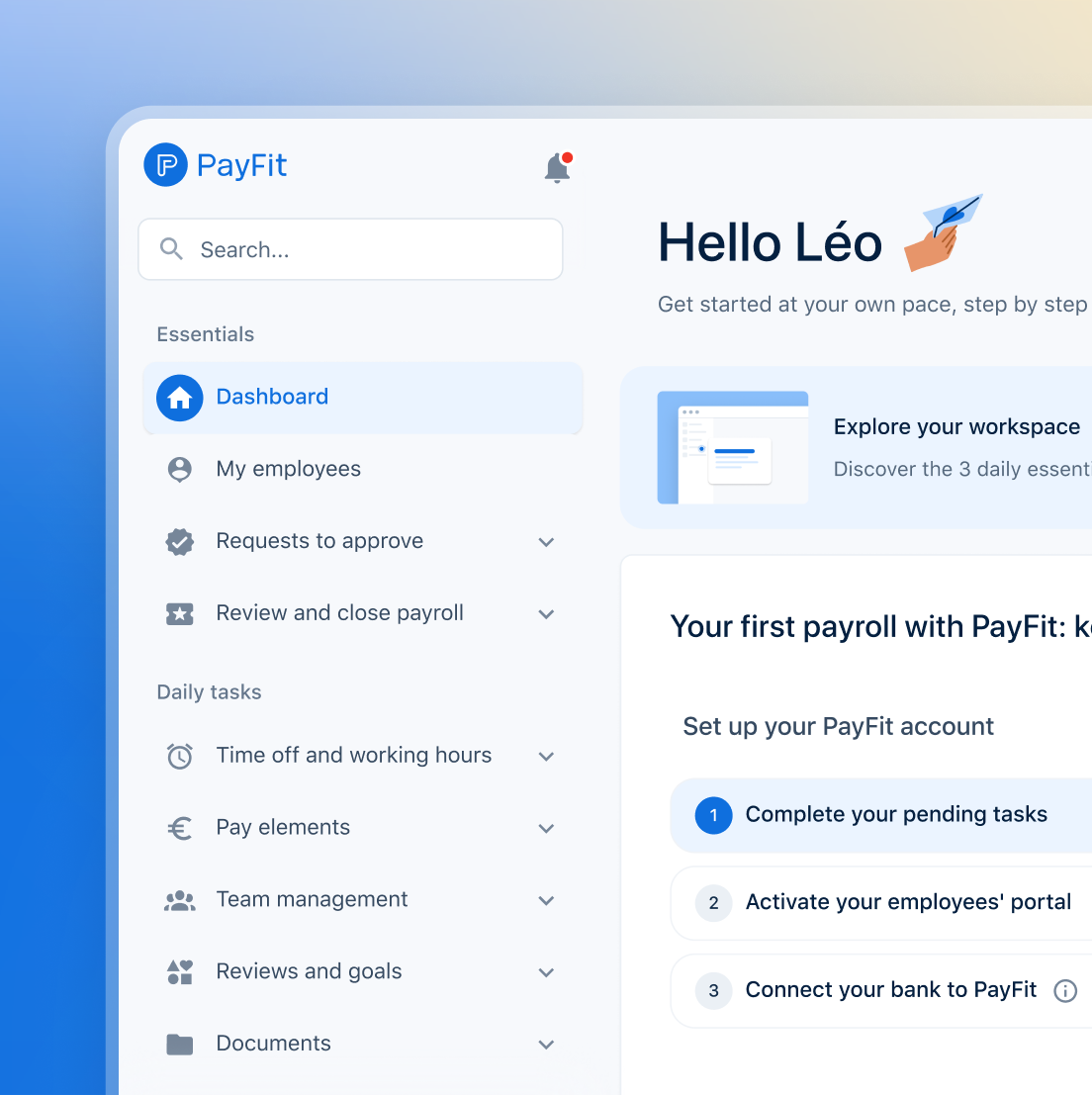✨ Health insurance, now in PayFit - learn more
💷 All the rates & thresholds you need to know for 25/26...right here
✨ The Payroll Journey: Start, Scale & Succeed Globally - learn more
✨ Health insurance, now in PayFit - learn more
💷 All the rates & thresholds you need to know for 25/26...right here
✨ The Payroll Journey: Start, Scale & Succeed Globally - learn more


The cost of recruitment includes direct and indirect costs, not just agencies or job ads
Internal time and lost productivity are major hidden costs for employers
Time to hire has a direct impact on total recruiting spend
A poor hiring decision can double the cost through early turnover
Tracking recruitment costs helps companies improve hiring efficiency
Recruitment often looks like a simple line in the budget. In reality, the cost of recruitment is a mix of visible spend and hidden effort, and it can climb fast for any business, especially when a role stays open for weeks. If you’re scaling, making your first hires, or replacing key team members, understanding what you really pay for (and why) helps you make the right decisions.
This guide breaks down the full picture: where the money goes, what employers commonly miss, and how to calculate a realistic cost per hire for your company, without turning it into a spreadsheet nightmare.
Recruitment costs usually fall into two categories: direct costs and indirect costs. Direct costs show up clearly (invoices, job ads, recruiting services). Indirect costs are often the bigger issue because they show up as “just work”, the hours managers and staff spend screening candidates, interviewing, chasing feedback, and covering gaps.
If you want to reduce costs without lowering hiring quality, this distinction matters. Most companies cut the obvious spend first, but the real savings often come from tightening the process and reducing time lost internally.
Many employers underestimate recruitment costs because internal time and lost productivity are rarely tracked. Those hidden costs can easily represent 30–50% of the real cost per hire, particularly for roles that take several weeks to fill or require multiple interview stages.
Direct costs are the easiest to spot because they’re paid out to someone: a job board, a recruitment agency, or a supplier. Typical examples include:
Job advertising (job boards, paid social, niche sites)
Recruitment agencies or headhunters
Background checks and assessments
Recruitment software and solutions
These costs can still be significant, especially in a competitive market or for specialist roles. But they’re only part of the story, and they’re rarely the biggest driver of the total cost over time.
Indirect costs are the ones that quietly add up inside the company. They’re easy to overlook because they don’t always come with a price tag, but they still cost money in the form of time, delays, and additional pressure on teams.
Common indirect costs include:
HR and manager time (shortlisting, interviews, approvals)
Lost productivity while the role is vacant
Overtime or temporary cover for the team
Training and onboarding time
Early turnover and rehiring
👉 To note
A longer hiring process doesn’t just increase recruiting spend, it can also damage team performance and retention. When a role stays open, other workers pick up the slack, managers spend more time firefighting, and priorities slip. Often, speeding up decision-making has a bigger impact than cutting job ad budgets.
| Cost category | What it includes | Why it matters for employers |
|---|---|---|
| Advertising costs | Job boards, social ads, careers pages | Costs rise fast for scarce profiles |
| Agency fees | Recruiters, headhunters | Often 15–30% of annual salary |
| Internal time | HR, managers, interviews | Biggest hidden cost |
| Tools & solutions | ATS, assessments, checks | Necessary but often underestimated |
| Onboarding | Training, equipment, admin | Delays productivity |
| Lost productivity | Vacant roles, overtime | Remains invisible in budgets |
| Turnover | Early leavers, rehiring | Can double recruitment cost |
Time is one of the biggest multipliers in recruitment. Every additional week a vacancy stays open affects output, priorities, and morale, and it creates extra work across the business. Teams may rely on overtime, managers may spend more time coordinating, and projects slow down.
It also changes candidate behaviour. In a fast-moving market, strong candidates don’t wait forever. If you take too long to respond, you may lose the candidate; and the cycle starts again with a new search.
The hidden cost of recruitment thus isn't just advertising spend, it's the hours managers spend writing job descriptions, screening CVs, and coordinating interviews. AI HR prompts can reduce this time investment significantly, allowing your team to focus on candidate relationships rather than admin.
2026 AI HR prompts guide
To calculate your cost per hire, start by grouping costs into two buckets:
1) External recruiting costs
Job ads
Agency fees
Tools, checks, and assessments
2) Internal costs
Time spent by HR and hiring managers
Interview time across the team
Admin and onboarding time
Productivity loss while the role is unfilled
Then divide the total by the number of hires you made in a set period (for example, a quarter). This gives you a baseline you can track over time and use to make better decisions about what to improve.
If you want a simple way to begin, track just two inputs first: (1) external spend, and (2) the total hours your team spends per hire. That alone will already give you a clearer picture than most companies have today.
Lowering recruitment costs doesn’t mean rushing hires or lowering standards. It’s about removing friction so the business can hire faster, and more consistently while giving candidates a better experience.
Here are practical levers that typically reduce costs without hurting quality:
Clarify the role early (what “good” looks like in the first 90 days)
Reduce delays between interview stages and decisions
Use structured interviews so the team can compare candidates fairly
Build a pipeline so you’re not always starting from zero
Improve onboarding so a new hire becomes productive faster
You don’t need a perfect system on day one. Even small improvements, like cutting one interview stage or agreeing decision criteria upfront, can reduce the additional time and internal workload that drives recruitment cost up.

Add external costs (ads, agencies, tools) and internal costs (HR time, interviews, onboarding, productivity loss). Divide by the number of hires to calculate your cost per hire.
It varies by role and sector. Many UK employers estimate a few thousand pounds per hire, while senior or specialist roles can cost significantly more once internal time and lost productivity are included.
A longer process increases internal workload, delays output, and can lead to overtime or temporary cover. It can also cause you to lose candidates in a competitive market, forcing you to restart the search.
Yes. Internal time is often the biggest hidden cost because multiple people get involved: HR, hiring managers, and other staff supporting interviews, feedback, and approvals.
Agencies can be helpful for hard-to-fill roles, urgent hires, or niche markets. The key is to compare the fee against the time saved internally, and whether the agency improves candidate quality.

Discover the true cost of employing someone in the UK, including updated NI rates, pension contributions, and hidden expenses.

One of the most powerful and often underutilised staffing strategies is looking within. Here, we break down internal recruitment for UK businesses.

We walk you through the recruitment process, offering clear guidance and best practices to help UK businesses attract and retain top talent.

Despite the significant job losses that have occurred as a result of the pandemic, some organisations have continued to recruit. Discover how they've adapted their recruitment processes and hear from an industry expert on the future of recruitment post-pandemic.

You only get one first impression. Building a strong onboarding process is the best way to welcome and retain new employees.

See what's new in PayFit
New features to save you time and give you back control. Watch now to see what's possible